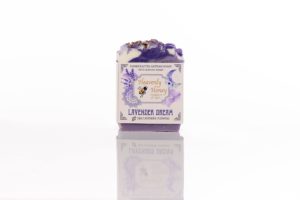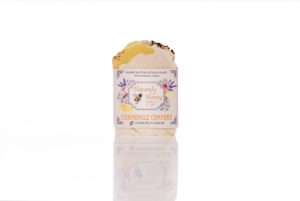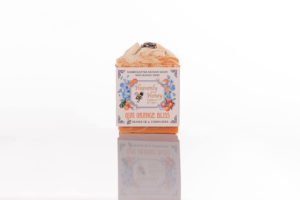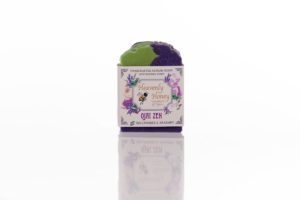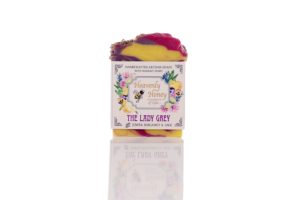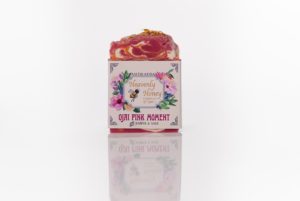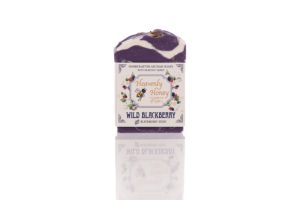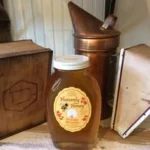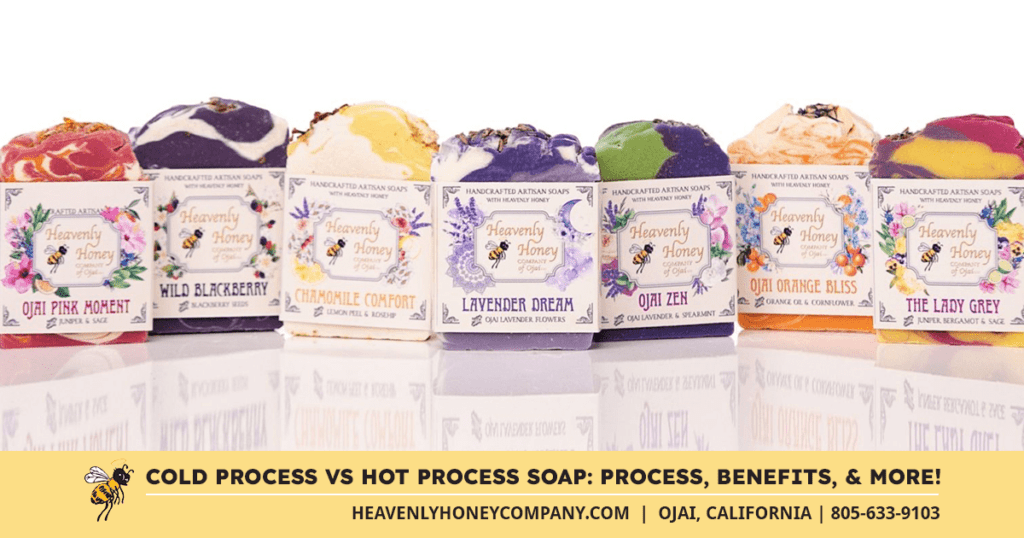
Welcome to the Heavenly Honey Company (HHC), where the art of soap making is not just a process but a passion. In artisan soap crafting, two primary methods are often discussed: cold and hot. While the soap we sell at HHC is a result of the cold process method, incorporating our signature honey into each bar, it’s essential to understand both techniques to appreciate the artistry behind each soap bar. In this detailed article you will learn the primary differences of cold process vs hot process soaps.
As much as I would love to add “soapmaker” to my many titles here at HHC, I know when to call in the pros for a pro result! My dear friend Leanne Rains, who owns and operates From the Heart of Ojai, crafts our cold process soap for us. I threw her the challenge one night at a corporate event we were both demonstrating our “goods” at – “use my honey in your cold process soaps for my store and I will be your best customer!” She did and I am!
Our soaps are VERY popular, I work hard to keep up with my refill list and Leanne works hard making the soaps for me! She is a true Soap Master!
EMBRACE NATURE’S LUXURY WITH HHC’S COLD PROCESS SOAPS! 🍯🌸🧼
CHAMOMILE COMFORT SOAP: Unwind with the calming embrace of chamomile and our signature honey. A serene bath experience awaits.
LAVENDER DREAM SOAP: Let the soothing scent of lavender enriched with honey transport you to a world of relaxation.
OJAI ORANGE BLISS SOAP: Energize your mornings with the zesty, sweet aroma of orange, perfectly blended with moisturizing honey.
OJAI PINK MOMENT SOAP: Experience the magic of Ojai sunsets in a bar, combining herbal aromas with the richness of honey.
OJAI ZEN SOAP: Find balance with the calming blend of spearmint, lavender, and honey for a mindful, soothing cleanse.
LADY GREY SOAP: Indulge in the elegance of bergamot, juniper, and sage, enriched with honey for a luxurious wash.
WILD BLACKBERRY SOAP: Enjoy the indulgent, fruity richness of wild blackberries mixed with nourishing honey for a pampering bath.
Now let’s jump into The Differences Between
Cold Process and Hot Process Soaps!
Understanding Cold Process and Hot Process Soap Making
Cold Process Soap: This method is a testament to patience and precision. Mixing fat oils (like olive or coconut oil) with a lye solution (sodium hydroxide and water). The mixture undergoes a chemical reaction known as saponification, transforming into soap over time. Cold-process soap is known for its smooth texture and ability to retain the benefits of essential oils and natural additives.
Hot Process Soap: In contrast, the hot process speeds up saponification using external heat. Soap makers often use a slow cooker to maintain consistent heat, causing the soap batter to cook and thicken. This method allows for a quicker cure time, making the soap ready to use sooner than its cold process counterpart.
The Art of Adding Honey: Benefits and Challenges
At HHC, our unique soap-making twist involves incorporating our locally sourced honey into each bar. Honey is renowned for its moisturizing and antibacterial properties, making it a luxurious addition to soap. However, integrating honey into soap presents unique challenges, especially in the cold process method.
Learn more benefits in our article “The Benefits of Soap Made with honey“
Challenges and Triumphs with Honey
Incorporating honey into cold-process soap is a delicate art. Honey accelerates the saponification process and can cause overheating. However, for HHC, Leanne has mastered this challenge, ensuring each bar is perfectly balanced, retaining our honey’s moisturizing and antibacterial benefits.
Why Honey is Rare in Cold Process Soaps
Honey naturally accelerates the saponification process, generating more heat. This can lead to complications like overheating or uneven texture in cold process soaps. It’s a delicate balance that requires skill and experience, which is why you rarely find cold process soaps with raw honey.
Cold Process vs Hot Process Soaps: A Detailed Comparison
Pros of Cold Process Soap
- Texture and Appearance: Cold process soaps, such as those crafted for Heavenly Honey Company, are known for their smooth, refined texture. This method allows for a more aesthetically pleasing and luxurious feel.
- Cure Time Benefits: Cold process soaps require a longer cure time, resulting in a milder and gentler bar. The extended curing period allows for a more consistent and skin-friendly pH level.
- Ingredient Preservation: This method is particularly effective in preserving the natural properties and scents of delicate ingredients like honey. The absence of external heat means that the beneficial qualities of these additives are maintained throughout the soap.
Cons of Cold Process Soap
- Longer Production Time: The extended cure time of 4-6 weeks means it takes longer to produce and bring the product to market.
- Complexity in Handling Ingredients: Incorporating ingredients like honey requires careful temperature control and precision, making the process more challenging.
Pros of Hot Process Soap
- Quick Cure Time: One of the most significant advantages of hot-process soap is its quick cure time. The soap is ready to use almost immediately after cooling and hardening, ideal for soap makers needing to meet immediate demand.
- Practical for Certain Ingredients: The hot process can be more forgiving for integrating certain ingredients that might not fare well under the cold process method.
Cons of Hot Process Soap
- Texture and Appearance: Hot process soaps often have a thicker, more rustic appearance. This might be less appealing to those who prefer the smoother finish of cold-process soaps.
- Potential Alteration of Ingredients: The cooking phase in hot process soap making can alter the properties of some additives. Essential oils and fragrances might change under high heat, affecting the final scent and benefits of the soap.
The Heavenly Honey Company Approach
We’ve honed our technique to incorporate honey without compromising the quality of our cold process soaps. By carefully controlling temperatures and soap batter consistency, we ensure each bar retains the benefits of honey while maintaining the desired texture and appearance.
The Scent and Feel: Essential Oils and Natural Additives
Our cold process method enriches our soaps with a blend of essential oils and natural additives. These ingredients impart a delightful aroma and contribute to the soap’s skin-nourishing properties. From lavender to citrus, each bar is a sensory journey.
Cure Time: Patience Brings Perfection
Cure time is another critical aspect of soap making. Cold process soaps require a longer cure, typically 4-6 weeks, allowing the soap to harden and develop a gentle, skin-friendly pH. With their expedited saponification, hot-process soaps are ready for use much sooner.
The Final Product: A Bar of Pure Bliss
When you choose a bar made through the cold process, each HHC soap is a work of art. Including our honey makes our soaps unique and adds a touch of luxury to your daily routine. The result is a bar that cleanses, moisturizes, and delights, embodying the care and expertise of our dedicated artisans.
Our Cold Process Soap Collection
Here at Heavenly Honey Company, we offer a captivating array of cold process soaps, each uniquely inspired by the natural beauty of Ojai and their delightful tea blends. Here’s a closer look at their enchanting collection:
Chamomile Comfort Soap: Imagine the soothing embrace of chamomile, renowned for its calming properties. This soap is likely a haven for those seeking a gentle, relaxing bath experience. Its potential benefits include soothing irritated skin and providing a tranquil aroma that eases the mind.
Lavender Dream Soap: Infused with lavender’s serene and dreamy scent, this soap is a perfect companion for a peaceful, rejuvenating cleanse. Lavender is known for its stress-relieving qualities, making this soap ideal for unwinding after a long day.
Ojai Orange Bliss Soap: Capturing the vibrant, sweet citrusy zest of oranges is a refreshing and invigorating choice. The uplifting aroma of orange can energize the senses, making it a great pick-me-up for morning routines.
Ojai Pink Moment Soap: Inspired by the picturesque Ojai sunsets, this soap offers a blend of herbal aromas like juniper and sage that calm and uplift the spirit. It’s a tribute to those magical moments when the sky turns a soft pink, reflecting a sense of peace and beauty.
Ojai Zen Soap: Designed to bring a sense of tranquility, this soap combines the essence of spearmint and lavender to promote relaxation and mindfulness. It could be the perfect choice for a meditative, soothing bath experience, helping to center the mind and body.
The Lady Grey Soap: A nod to the classic elegance of Lady Grey tea, this soap combines bergamot, juniper and sage for a sophisticated and refined scent. It’s perfect for those who appreciate the finer things in life, providing a luxurious and aromatic cleansing experience.
Wild Blackberry Soap: With the essence of juicy wild blackberries, this soap is a sweet and indulgent choice. Its rich, fruity aroma will transform your bath into a luxurious, berry-filled escape.
Each soap in this collection, crafted with the meticulous cold process method, is a cleansing product and an experience. Including honey in these soaps adds a touch of luxury, enhancing their moisturizing properties and making them a gentle, nourishing one of a kind choice for all skin types. Our commitment to natural ingredients and artisanal quality shines through in each bar, offering a slice of Ojai’s natural beauty in your daily routine.
Conclusion
At Heavenly Honey Company, our commitment to the cold process method stems from our desire to produce the highest quality soaps enriched with the natural goodness of honey. While other companies may opt for the hot process method for its speed and efficiency, we believe in the artistry and benefits that come with the patience and precision of the cold process. Each bar of HHC soap is not just a cleansing agent; it’s an experience, a testament to the beauty and benefits of nature’s bounty, and a reflection of our dedication to craftsmanship and quality.
FAQs About Cold Process and Hot Process Soaps
What are the main differences between cold process and hot process soaps?
The primary difference lies in the saponification process. Cold process soaps are made without external heat, leading to a longer curing time (about 4-6 weeks), which results in a smoother, more refined texture. Hot process soaps are cooked, which speeds up the saponification process and allows the soap to be used almost immediately after it cools and hardens. Still, they often have a thicker, more rustic appearance.
Why do cold process soaps take longer to cure compared to hot process soaps?
Cold process soaps take longer to cure because they naturally saponify and harden over time without external heat. This extended curing period allows for a more consistent and gentle bar as it slowly reaches an ideal pH level that is kind to the skin.
Can both cold process and hot process soaps include natural ingredients like honey?
Yes, both methods can incorporate natural ingredients like honey. However, in cold process soaps, adding honey is more challenging due to its natural tendency to accelerate saponification and potentially cause overheating. In hot process soaps, the controlled cooking environment can make it easier to integrate ingredients like honey.
Are there any differences in the moisturizing properties of cold process vs. hot process soaps?
Both methods can produce soaps with good moisturizing properties. However, cold process soaps are often considered superior in retaining the moisturizing benefits of natural oils and additives, as the lack of external heat helps preserve these properties.
Do cold-process and hot-process soaps have different pH levels?
The pH levels of cold and hot process soaps are generally similar once the saponification process is complete and the soap is fully cured. However, cold-process soaps may have a slightly milder pH due to the gradual curing process. It’s important to note that all true soaps, regardless of the method used, will have an alkaline pH.

